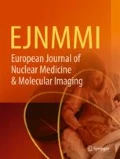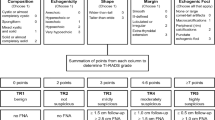Abstract.
Over half a century, treatment of thyroid autonomy with an oral dose of iodine-131 has proven to be effective. The optimum management strategy for the patient is, however, still a matter of debate. The article provides an overview of the pathogenesis of functional autonomy and its clinical relevance. According to the guidelines on both sides of the Atlantic, radioiodine treatment is considered the most comfortable and economical approach to the treatment of the toxic nodular goitre. Some differences in the preparation procedures in the guidelines of the American and the German Society of Nuclear Medicine are discussed with respect to therapy results and the subtypes of thyroid autonomy. The results of studies are summarised concerning changes in thyroid function and thyroid volume after a course of radioiodine treatment. Therapy-related risks, such as immunogenic hypothyroidism or thyroid cancer, are discussed. 131I treatment of functional autonomy and hyperthyroidism is considered an effective and safe procedure.
Similar content being viewed by others
Author information
Authors and Affiliations
Additional information
Electronic Publication
Rights and permissions
About this article
Cite this article
Reiners, C., Schneider, P. Radioiodine therapy of thyroid autonomy. Eur J Nucl Med 29 (Suppl 2), S471–S478 (2002). https://doi.org/10.1007/s00259-002-0910-6
Issue Date:
DOI: https://doi.org/10.1007/s00259-002-0910-6




